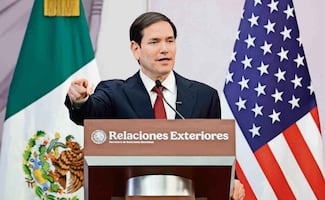Más Información

New York Times destaca rol de Harfuch en el combate del narco; resalta intercambio de inteligencia con EU

Marco Rubio destaca labor de seguridad de México; "están haciendo más que nunca en su historia", afirma

"Queremos cerrar este capítulo", dice Salinas Pliego al SAT; esperarán a enero a conocer fundamentos legales de adeudo fiscal
As worries loom over the future of Mexican tourists and immigrants in the U.S., Canadian ambassador to Mexico, Pierre Alarie, reaffirmed Canada's commitment to lifting the tourist visa requirement for Mexicans beginning December 1.
In an interview at The College of Mexico (Colmex) in Mexico City, Ambassador Alarie said that everyone, not only Mexicans, should be able to receive Electronic Travel Authorization (eTA) to travel to or board layover flights in Canada.
He explained that all eTA requests are completed online, take only two to three minutes to fill out and cost seven Canadian dollars. He also said that the eTA does not qualify as a visa and is simply a formality for foreigners wishing to enter the country by plane and that that once obtained, is good for five years.
Ambassador Alarie participated in the Mexico-Canada Seminar where officials and leaders discussed Justin Trudeau's new foreign policies, one of which includes defining Mexico as a strategic partner of Canada.
When discussing the now president-elect Donald Trump, Ambassador Alarie said that leaders from Mexico and Canada should handle his victory and upcoming administration with composure, especially with regards to NAFTA, which he said was signed into law almost 23 years ago and “it might be time to review certain chapters in the agreement and discuss how to improve it.”
“With this vision in mind, we're ready to sit down with our Mexican colleagues whenever they'd like to discuss the agreement's future.” He added that Mexico's Minister of Economy, Ildefonso Guajardo, shares that sentiment and that “Mexico is also ready to sit down and renegotiate certain chapters in NAFTA.”
Ambassador Alarie said that his country will approach Mexico to begin discussions, although he feels that both countries should wait to see what the U.S.'s actual plan is regarding NAFTA.
“We're in no rush, we will wait for both our Mexican and U.S. partners to decide when to sit down to discuss NAFTA… Things are always said during elections, but there's a big difference between election rhetoric and a government's actual plans,” he said.
Canada is a country of migrants that currently receives around 300,000 per year, according to the ambassador. “The Canadian government wants to increase that number to 380,000 in upcoming years and we expect that Mexicans will be a part of the figure,” concluded Ambassador Alarie.
Noticias según tus intereses
[Publicidad]
[Publicidad]











